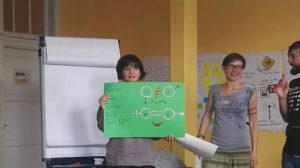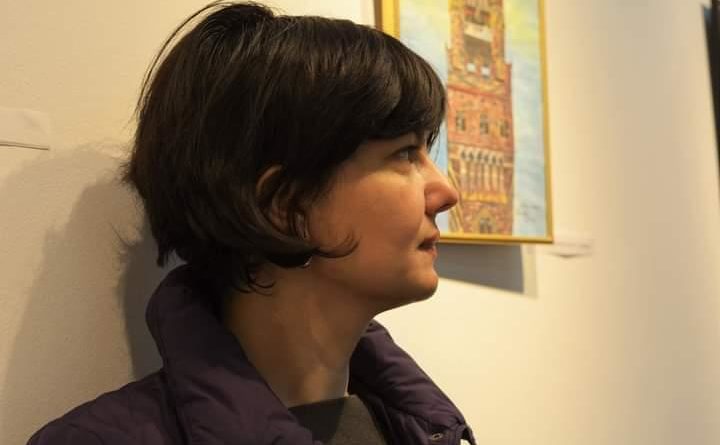“Respect and seriousness are important in relations with earthlings”. – Lavinia Vișan, teacher from Târgoviște, Dâmbovița
My friend, Lavinia Vișan teaches philosophy and logic at the “Petru Cercel” Theoretical High School in Târgoviște. She has been a teacher since 2000, since she graduated from college, and for her, teaching is a vocation. That’s right. In addition to a master’s degree in organizational management, numerous professional training courses, Lavinia has a national trainer certificate. She is invited to various regional, national and international events, evaluator in baccalaureate commissions and coach of Olympians with commendable results.As project manager in the high school where she teaches, she has helped many children to learn by traveling and experimenting in E+ mobility projects. Is it a lot, is it a little for someone whose life swings between a teaching career, cats, dogs and loved ones? I hope that each reader of the interview below will give their own answer at the end of its journey. Lavinia Vișan remains one of the most discreet and quiet friends I acquired long before the Erasmus+ Embassy was invented.
M.N.: – How do you see today the Erasmus+ program?
L.V.: – Hard! The ideal is to have a large team that actually works. The reality is that there is only one person at the helm, and small activities are carried out by the mobility beneficiaries. Lack of time, interest and fear of the unknown are the reasons why the team is not big. And “Erasmus Accreditation” is a developing program where we all learn on the go. Not to be missed!
It is the means by which, at any age, you become independent. At the same time, you develop your life skills: from looking for means of transport and accommodation (within the small budget, but also in the allotted time) adapting to a new culture and language to managing the group, solving problems or the relationship with the authorities. It’s a fast-paced, ground-breaking learning experience. Over time, it proves beneficial for everyone. It is sad that multinationals do not take advantage of Erasmus+ project coordinators because they would be good managers of their projects.
M.N.: – I noticed that most of the teachers writing Erasmus projects are foreign Petru Cercel” Theoretical High School or social science teachers. You are part of this majority. Is it easier for you to understand bureaucratic and logical mechanisms and reconcile them with creativity or are there other explanations?
L.V.: – I’m sure that more teachers from other specializations would get involved, but their time is busy with the preparation of the final exams. In addition, we found a fear of working in a foreign language less known by Romanians, even if it is English. For this reason, many Erasmus+ project writers are language teachers. It is true that a foreign language gives you the necessary ease to implement projects. But I urge all those who know English at A1 level to get involved. To have the courage to write, speak and read using any resource, because in this way they will develop their language skills. I started from here, in 2007, when I started participating in courses and youth exchanges. And I’m still learning. In relation to the social science teachers, I assume that, through the prism of the contents taught, we are connected to European values and that reduces a little the work within the projects, especially since they are targeted by the European Commission and the Erasmus+ program.
M.N.: – Do you remember your first Erasmus+ experience?
L.V.: – The first experience was in October 2007, at a Comenius course in French, about teaching through problem situations. That was my rocking moment. I learned that you don’t have to answer to the authorities when they are ironic. I learned that it is important to speak using those two words that you know because that is how communication begins. Respect and seriousness are important in dealing with earthlings. And then I got the taste to see the world, combining the pleasant with the useful.
M.N.: – Why did you want to become an Erasmus+ Ambassador? You do a lot of volunteering anyway.
L.V.: – Since 2010 I have participated in many courses for youth workers and youth exchanges and in two editions of the international CONNECTOR event, and this experience recommended me to become an Erasmus+ Ambassador. Over time, I recommended the program, which I still do now, but I also add this status that I have. It is the way in which the National Agency (ANPCDEFP) shows its respect for our work, which most of the time is unpaid.
M.N.: – Do you have any project in mind?
L.V.: -From 2019 until now, we have implemented three projects, and the fourth is ongoing. But I know for sure I’m not stopping. Together with two colleagues, we are trying to figure out the Jean Monnet Project for schools. I volunteer because that’s who I am, and if an opportunity arises for the institution where I work, I’m interested. I want as many colleagues and students as possible to benefit from the advantages of the Erasmus+ projects because through them they can develop their professional and personal skills. At the same time, any money brought to the school budget is necessary. So far, from the projects we have implemented, we have bought books and other materials necessary for the smooth running of the school: small things, few, but which make a difference. And, who knows?, maybe my way of being will be contagious and other project writers will emerge.

